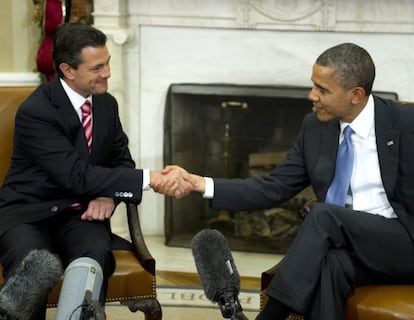Obama looks to a new US-Mexico axis
Washington seeks a partner to reinforce its leadership in the 21st century


One of the main goals of US foreign policy during Barack Obama’s first term in office was to reset — a term coined specifically for this case — relations with Russia, until then subjected to multiple disagreements and misunderstandings. At the start of Obama’s second term, something similar is being attempted with Mexico, as bilateral relations are excessively dominated by drug trafficking and border tension. Washington is seeking a new model that can better exploit the enormous potential for cooperation between two of the world’s strongest and most dynamic economies.
“Mexico and the US are already exchanging 1.4 billion dollars’ worth of daily trade, over a billion in the border area alone. With greater cooperation in innovation and education, North America’s possibilities as a strong economic bloc become obvious,” says a high-ranking official in the US administration, who also notes that progress is being made to get Mexico to join the Trans-Pacific Partnership.
The main goal of Obama’s visit to Mexico, scheduled for Thursday and Friday, is to showcase this new approach — more practical and ambitious — to bilateral relations with a neighbor whose own development and high migration rates ensure that it will have considerable influence on the future of the United States.
Relations between the nations on both sides of the Rio Grande have a long history of conflict in which prejudice and rhetoric have generally held sway over respect and dialogue. Home to very different cultures, and confronted with the violent construction of their respective borders, coexistence between Mexico and the US has been difficult over the last two centuries. But a shared identity has also been quietly developing on many fronts, from regional cuisine to business ventures.
A more democratic Mexico is a better business partner in ambitious projects like competing with China
Under Felipe Calderón, relations were practically monopolized by the Mexican president’s war on drug cartels, with military, economic and intelligence support from the US: it was the Mérida Plan, signed by George W. Bush and carried on by Obama. But the failure of that war and the election of a new president, Enrique Peña Nieto, who wants a shift in strategy, has given Obama an opportunity to make a change of his own in US priorities. “It’s not about renouncing security in Mexico, but about raising the economic and trade profile of the relationship, which was too low until now,” said the same US administration source.
However, a few congressmembers and human rights associations are concerned that this new relation with Mexico will entail silencing the abuse that gets reported in that country. Human Rights Watch recently alerted about thousands of people who remain unaccounted for in the war against drug cartels, and a congressional group sent a letter to President Obama a few days ago requesting that he address this issue during his meeting with Peña Nieto later this week.
Official sources in Washington assert that the US president will include the topic of human rights on his agenda, as well as transparency, judicial independence and good governance as indispensable elements in healthy bilateral cooperation.
But this, of course, is not the priority issue. This trip is meant to underscore US satisfaction and surprise at the structural reforms undertaken by Peña Nieto. Until recently, nobody in the US gave a penny for him; now, he is the role model that gets mentioned in every conversation about Latin America.
The (provisional) success of Peña Nieto and the (temporary) economic progress of Mexico are two more arguments in favor of reform of migratory policy. It is becoming increasingly evident that a more prosperous Mexico is a Mexico with fewer outgoing migrants, and that a more democratic Mexico is a better business partner in ambitious projects like competing with China for global leadership. Aided by the European crisis and by the sustained growth of the Mexican economy for over three years — though not at the same speed as other countries in the region — the US-Mexico axis is causing great expectation elsewhere in the world.
Tu suscripción se está usando en otro dispositivo
¿Quieres añadir otro usuario a tu suscripción?
Si continúas leyendo en este dispositivo, no se podrá leer en el otro.
FlechaTu suscripción se está usando en otro dispositivo y solo puedes acceder a EL PAÍS desde un dispositivo a la vez.
Si quieres compartir tu cuenta, cambia tu suscripción a la modalidad Premium, así podrás añadir otro usuario. Cada uno accederá con su propia cuenta de email, lo que os permitirá personalizar vuestra experiencia en EL PAÍS.
¿Tienes una suscripción de empresa? Accede aquí para contratar más cuentas.
En el caso de no saber quién está usando tu cuenta, te recomendamos cambiar tu contraseña aquí.
Si decides continuar compartiendo tu cuenta, este mensaje se mostrará en tu dispositivo y en el de la otra persona que está usando tu cuenta de forma indefinida, afectando a tu experiencia de lectura. Puedes consultar aquí los términos y condiciones de la suscripción digital.








































